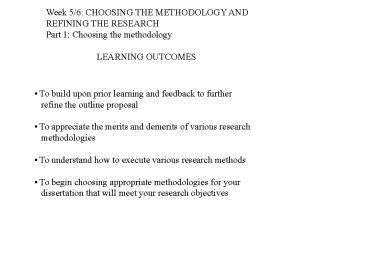Week 56: CHOOSING THE METHODOLOGY AND - PowerPoint PPT Presentation
1 / 15
Title:
Week 56: CHOOSING THE METHODOLOGY AND
Description:
METHODOLOGY. Justification of research problem and literature review ... METHODOLOGY - RESEARCH PROCEDURE. Description of the Chosen Method ... – PowerPoint PPT presentation
Number of Views:31
Avg rating:3.0/5.0
Title: Week 56: CHOOSING THE METHODOLOGY AND
1
Week 5/6 CHOOSING THE METHODOLOGY AND REFINING
THE RESEARCH Part 1 Choosing the methodology
LEARNING OUTCOMES
- To build upon prior learning and feedback to
further refine the outline proposal - To appreciate the merits and demerits of various
research methodologies - To understand how to execute various research
methods - To begin choosing appropriate methodologies for
your dissertation that will meet your research
objectives
2
RESEARCH IN THE MARKETING DOMAIN
Research in marketing
Aspects of marketing management
Aspects of consumers marketing
3
RESEARCH PROBLEM AND RESEARCH POSITION
Interpretivist/
Positivist/ Qualitative
Quantitative How and Why?
What? How should? Complex number
Limited number of issues
of
issues Seeking explanation/
Seeking generalisation understanding
4
DIFFERENT RESEARCH PHILOSOPHIES
- Interpretivism Defined-
- Interpretive
- Understanding
- Multiple realities
- Conceptual
- Situation specific
- Positivism Defined-
- Scientific
- Objective
- Validity Rigour
- Generalisable
- One reality
TO WHICH PHILOSOPHY DOES YOUR RESEARCH BELONG?
5
FOCUS OF RESEARCH PHILOSOPHIES
Concentrates on
Concentrates on description
understanding and explanation
and
interpretation
6
RESEARCH PHILOSOPHIES ROLE OF THE RESEARCHER
POSITIVISM/ POST-POSITIVISM
INTERPRETIVISM/ RELATIVISM
- Detached, external observer
- Clear distinction between reason and feeling
- Aim to discover external reality rather than
creating the object of study - Strive to use rational, consistent verbal,
logical approach - Seek to maintain clear distinction between
facts and value judgements - Distinction between science and personal
experience
- Researchers want to experience what they are
studying - Allow feelings and reasoning to govern actions
- Partially create what is studied, the meaning
of phenomena - Use of pre-understanding is important
- Distinction between facts and value judgements
less clear - Accept influence from both science and
personal experience - Primarily non-quantitative
7
- WHICH METHODOLOGY?
- What kind of information/data?
(qualitative/quantitative?) - How can information/data be reached?
(who/what will provide the data?) - How will information/data be gathered?
(methods?)
8
- METHODOLOGY
- Several methods?
- One major method
- Other secondary methods
- Exploratory - What are the variables involved?
- Explanatory - Relationships between identified
and measured variables
9
- METHODOLOGY
- Justification of research problem and literature
review - Awareness of positivist/phenomenological
paradigms - Unit of analysis - population, sample
- Instruments and procedures used (measures,
responses, when, where, who, non-responses) - Limitations both of the method and practical
issues - Specific methods for analysing data, definitions
and interpretations and assumptions
10
- METHODOLOGY - RESEARCH PROCEDURE
- Data Gathering Procedure (The research
instruments) - Questionnaire Design
- Interview Protocol
- Administration Research Instruments
- Testing Procedures
- Number of Respondents and Justification
11
- METHODOLOGY - RESEARCH PROCEDURE
- Description of the Chosen Method
- Justification of Method (Why is this method
chosen?) - Appropriateness/Suitability (Stemming from
literature/
conceptual model) - Value of the Method
- Advantages of the Method
- Other Possible Methods
- Deficiencies of Other Methods
- Advantages of Chosen Method Over Others
12
- METHODOLOGY - RESEARCH PROCEDURE
- Data Analysis Procedure (How the data will be
analysed) - Description of Statistical Analysis - - What
will it yield? - What cross analysis is
planned? - Description of Qualitative Analysis - - What
will it yield? - How will data be organised
for analysis?
13
- METHODOLOGY -
- Use of Method
- Description of What Happens First
- Description of What Happens Next, etc.
- Expected Timescales
RESEARCH PROCEDURE
14
- METHODOLOGY CHAPTER
- Written so that others can replicate
- More detail if qualitative because of the
degree of influence by the researcher
15
METHODOLOGY CHAPTER OUTLINE
- Introduction
- Justification of the research method(s) chosen
- Research procedures-
- Steps followed and why
- Justification of the specific techniques used
vs others - Links between aims/objectives and data gathering
content - Conclusion/link with other chapters































